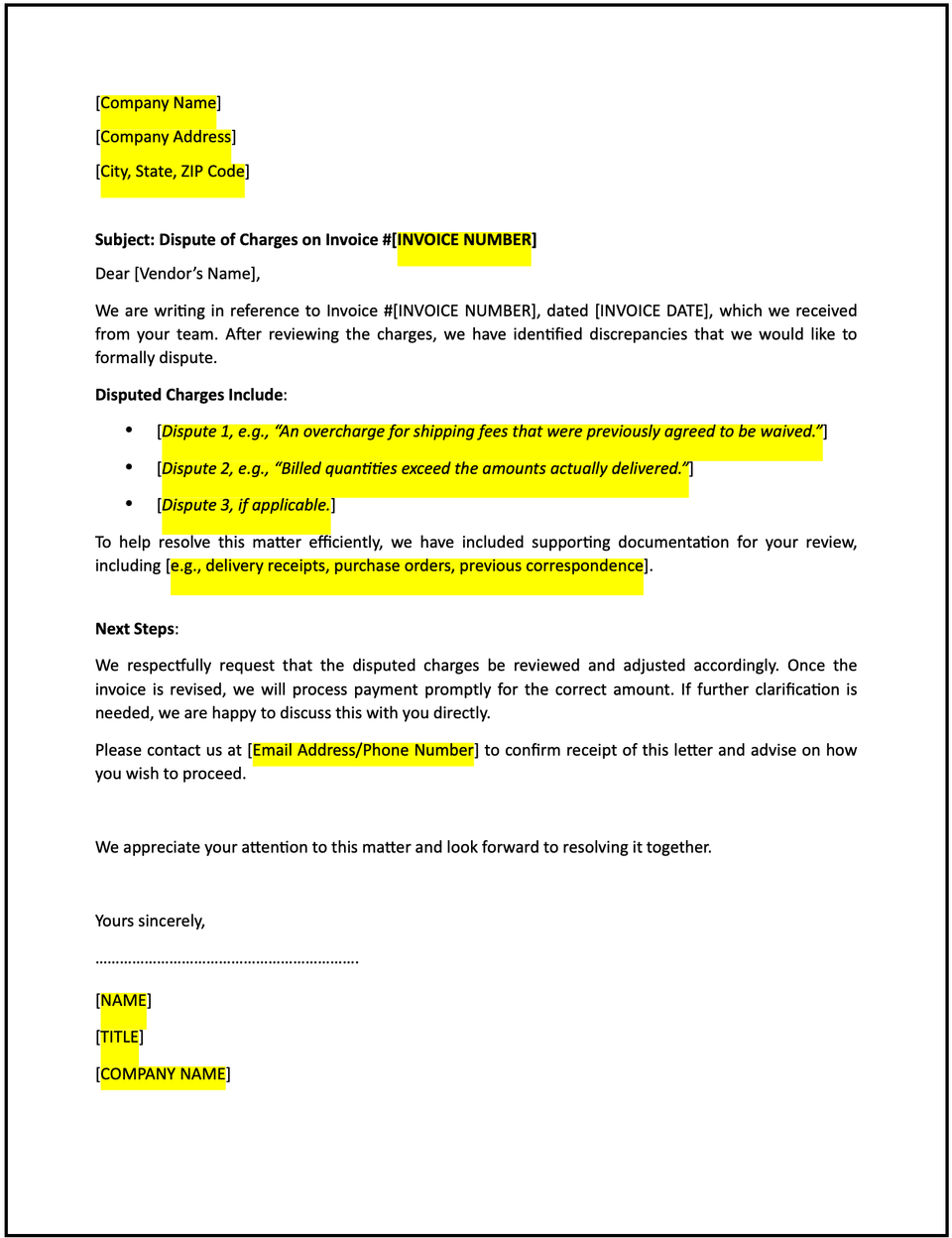Letter disputing vendor invoice charges: Free template

Letter disputing vendor invoice charges
A letter disputing vendor invoice charges is a formal communication used to raise concerns about specific discrepancies or inaccuracies in a vendor’s invoice. This letter outlines the disputed charges, provides evidence or context for the dispute, and seeks a resolution in a professional and collaborative manner.
How to use this letter disputing vendor invoice charges
- Open with an introduction: Address the vendor respectfully and reference the invoice by number, date, or other identifying details.
- State the purpose: Clearly communicate that the purpose of the letter is to dispute specific charges on the invoice.
- Provide details: Specify the charges being disputed, including amounts, descriptions, and why they are incorrect or unexpected.
- Reference supporting documents: Mention any contracts, purchase orders, or previous agreements that support your claim.
- Emphasize impact: Briefly explain how the disputed charges could affect your financials or operations.
- Request resolution: Propose a solution, such as correcting the charges, issuing a credit, or arranging a meeting to discuss further.
- Maintain a professional tone: Ensure the letter is clear, respectful, and focused on fostering a resolution while preserving the business relationship.
- Provide contact information: Include details for the recipient to reach out with questions or to discuss the matter further.
Benefits of using a letter disputing vendor invoice charges
This letter ensures a structured and professional way to address invoice discrepancies while fostering accountability and collaboration. Here’s how it helps:
- Promotes transparency: Clearly outlining the dispute ensures alignment and understanding.
- Reflects professionalism: A well-crafted letter demonstrates respect and a commitment to resolving issues constructively.
- Encourages accountability: Highlighting discrepancies reinforces the importance of accurate billing.
- Builds trust: Addressing concerns professionally fosters a positive and honest relationship.
- Supports resolution: Documenting disputes and proposed solutions ensures clarity and alignment.
Tips for writing an effective letter disputing vendor invoice charges
- Be specific: Clearly describe the disputed charges, referencing invoice details and supporting agreements.
- Use professional language: Maintain a respectful and constructive tone to foster collaboration.
- Provide context: Briefly explain why the charges are incorrect and how they deviate from agreements.
- Highlight mutual benefits: Emphasize how resolving the dispute supports a transparent and successful partnership.
- Include actionable steps: Share instructions for resolving the issue, such as issuing a corrected invoice or scheduling a meeting.
- Keep it concise: Focus on the essential points while ensuring the tone is professional and engaging.
Frequently asked questions (FAQs)
Q: What details should I include in this letter?
A: Include the invoice reference, the specific disputed charges, and supporting documentation or agreements.
Q: Should I personalize the letter?
A: Yes, addressing the vendor by name and referencing specific invoice details demonstrates attentiveness and professionalism.
Q: Who typically sends this letter?
A: Procurement teams, finance departments, or business owners typically send this letter.
Q: How formal should this letter be?
A: The tone should be professional, respectful, and focused on fostering resolution.
Q: When should this letter be sent?
A: Send the letter promptly after identifying the disputed charges to ensure timely resolution.
Q: Can this letter request adjustments or credits?
A: Yes, proposing corrections or credits is appropriate for resolving disputes amicably.
Q: Is acknowledgment from the recipient required?
A: While not mandatory, requesting acknowledgment ensures the vendor is addressing your concerns.
This article contains general legal information and does not contain legal advice. Cobrief is not a law firm or a substitute for an attorney or law firm. The law is complex and changes often. For legal advice, please ask a lawyer.


